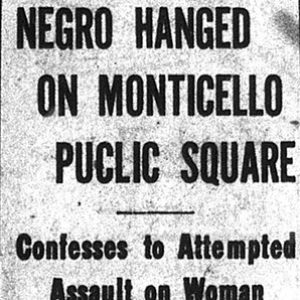calsfoundation@cals.org
Philip Slater (Lynching of)
On March 22, 1921, fifty-year-old Philip Slater was hanged on the public square in Monticello (Drew County) for allegedly assaulting a white woman in nearby Wilmar (Drew County).
Philip Slater was one of many African Americans who worked in Drew County’s timber industry, the largest industry in the county in 1920. According to the 1920 census, Slater and his wife, Jimmie, were boarding with Addie Green on Buber Street in Wilmar. Both Philip and Jimmie could read and write, and he was working as a laborer in a lumber mill. This may have been the large Gates Lumber Company, which was located in Wilmar. Slater was reportedly fifty years old when he was murdered.
According to the Arkansas Gazette, on their way to visit a neighbor on March 15, a white woman (whose identity is not specified in the report) and her three children took a short cut through the woods outside of Wilmar. When it started to rain, the family turned back toward home. She carried the baby, and her sons sheltered from the rain under a nearby tree. The mother then heard one of her boys crying, and discovered that he was struggling with an African-American man. She turned back to help her son and was herself assaulted. She fought back, and her assailant fled.
She reported the assault to the authorities, who promptly investigated. During the ensuing week, eighteen African-American men were arrested, but she was unable to identify any of them. Suspicion then fell on Slater, who had been charged with assaulting a black woman the previous November. On the morning of March 22, Wilmar mayor L. E. Dunlap and former city marshal Frank Owens arrested Slater at his workplace in Wilmar. He was put into a lineup with three other African Americans, and his alleged victim identified him.
Sheriff H. C. Burks of Monticello, along with two deputies, attempted to take Slater to Pine Bluff (Jefferson County) for safe keeping. A mob of about fifty men, most of them from Wilmar, stopped them with the intention of lynching Slater. When the officers returned to Monticello with their prisoner, they encountered a large mob surrounding the jail. They returned Slater to his cell, and Sheriff Burks tried to leave town, taking the keys to the jail with him. He was stopped and told that the mob would batter down the jail doors if he did not give up the keys. He surrendered the keys but asked the leaders of the mob not to lynch Slater. By 8:00 p.m., the mob numbered around 1,000, although the Gazette described the mob as “orderly.” Some men removed Slater from his cell and took him to the town square.
A rope was put around Slater’s neck, and he was hoisted partway up a telephone pole. He was then lowered and asked if he had anything to say. He allegedly confessed, saying, “I done it, gentlemen, but please give me a trial.” His request was ignored, and he was raised once again. According to the Gazette, “immediately pistols were brought into play. More than 100 shots were fired into the negro’s body.” Slater’s body was cut down about an hour later, in preparation for an inquest.
The coroner’s jury found that Slater “came to his death at the hands of unknown parties.” Slater apparently had relatives who lived in Wilmar, but they refused to get the body from the undertaker, and it was buried in the potter’s field in Monticello.
For additional information:
“Blame Not Fixed in Lynching Case.” Arkansas Gazette, March 24, 1921, p. 5.
Holley, Donald. “A Look behind the Masks: The 1920s Ku Klux Klan in Monticello, Arkansas.” Arkansas Historical Quarterly 60 (Summer 2001): 131–150.
“Negro Hanged on Monticello Public Square.” Arkansas Gazette, March 23, 1921, p. 1.
Nancy Snell Griffith
Clinton, South Carolina
 Civil Rights and Social Change
Civil Rights and Social Change Early Twentieth Century, 1901 through 1940
Early Twentieth Century, 1901 through 1940 Slater Lynching Article
Slater Lynching Article 




Comments
No comments on this entry yet.